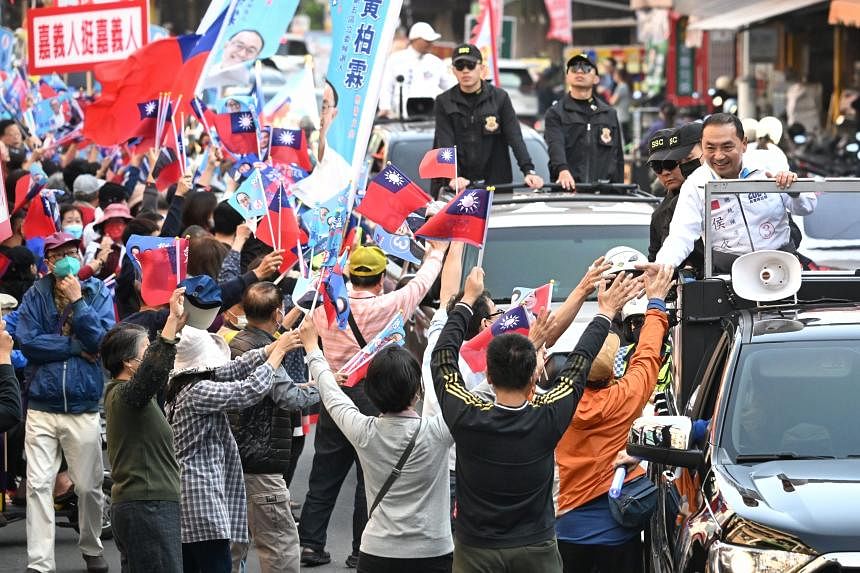TAIPEI/SINGAPORE – A false alarm over an air raid, balloons over Taiwan, a sex video.
With just a day to go before the Taiwan polls on Jan 13, “election interference” has become a buzzword as political parties accuse one another of benefiting from shadowy ploys.
The main opposition Kuomintang (KMT) has accused the ruling Democratic Progressive Party (DPP) of trying to hype up the China threat with a misleading alert about a Chinese missile launch over Taiwan when it was actually a satellite launch.
On Jan 9, at 3.17pm, mobile phones across Taiwan buzzed with an emergency “air raid alert” from Taiwan’s Ministry of Defence, warning in Chinese that China launched a satellite that crossed into the airspace over southern Taiwan.
But a line in English warned mistakenly about a missile: “Missile flyover Taiwan airspace, be aware.” There was a repeat alert just minutes later. The Defence Ministry later apologised for the error.
KMT presidential candidate Hou Yu-ih told reporters on Jan 10 that the DPP should not use government machinery to meddle in the election and create fear in order to win votes.
Controversy ensued over a sex video allegedly involving DPP legislator Lo Chih-cheng that circulated online last week, as well as an audio recording of what appeared to be a private chat between Mr Lo and President Tsai Ing-wen, in which he gave advice on government matters.
Mr Lo said he was the victim of a deepfake video featuring his likeness and called it a part of China’s bid to manipulate the Jan 13 general election, at which he is seeking re-election. He has likewise said the leaked recording, which was posted online at the weekend, was a result of attempts to influence the polls.
Accusations of election meddling have eclipsed discussions of issues like the economy in recent days. The Taiwanese will head to the ballot box on Jan 13 in Taiwan’s presidential and legislative elections. Mr Lai Ching-te of the ruling DPP, Mr Hou of the KMT, and Dr Ko Wen-je of the Taiwan People’s Party are contesting to be Taiwan’s next president. Ms Tsai is stepping down in May after reaching her two-term limit.
Dr Qi Dongtao, who researches Taiwan elections, said the false alarm and sex video incidents were unlikely to affect support for the DPP’s Mr Lai, who led in most opinion polls before a blackout on such surveys kicked in on Jan 3.
“The situation is about the same (from a week ago), with Lai the favourite to win, though not by a big margin,” Dr Qi, a senior research fellow at the East Asian Institute at the National University of Singapore (NUS), told The Straits Times.
One thing to watch, he added, is whether billionaire Terry Gou, founder of iPhone maker Foxconn, would pledge his support for Mr Hou, which would help the KMT.
Meanwhile, Beijing appears to be taking a more calibrated approach in trying to influence Taiwan’s election. China regards Taiwan as a part of its territory to be reunified with, but most Taiwanese prefer to maintain the status quo. Instead of conducting military drills, China has floated balloons over Taiwan. Since Dec 7, a total of 27 Chinese balloons have traversed the airspace near or over Taiwan, some near airbases in Taiwan.
“The idea behind this is to test the defences of the island,” said Mr Kalpit A. Mankikar, a fellow at the Observer Research Foundation, a New Delhi-based think-tank. “This is classical grey-zone warfare, where you’re trying to ascertain how your opponent reacts to the sighting of these balloons.”

NUS Business School professor in strategy and policy Lawrence Loh said the balloons represent “a tactical shift for now”.
Chinese military activity near Taiwan hit a peak in August 2022 after then US House Speaker Nancy Pelosi visited the self-ruled island. But thus far in 2024, only 11 Chinese military planes have crossed into Taiwan’s air defence identification zone.
Prof Loh told ST: “In the last couple of years or so, there were a lot of substantive movements of aircraft. But in this case (the balloons), I think from the substantive it goes on to the symbolic.”
He added: “It is very well calibrated in the sense that they do not want to too directly intervene militarily through a show of force, show of weapons. But at the same time, they want to send a certain signal just before the election, to leave options open.”
Besides balloons, China has also released a song aimed at the Taiwanese. On Dec 31, a channel under Chinese state broadcaster CCTV released a new music video for Tomorrow Will Be Better, which was first performed in 1985 by leading singers in Taiwan.
The new version features popular artistes from both sides of the Taiwan Strait, including actors Xiao Zhan and Wang Yibo from China as well as Nicky Wu and Ruby Lin from Taiwan. The underlying message of the video, which can be watched online, is that both sides of the strait are one family.

